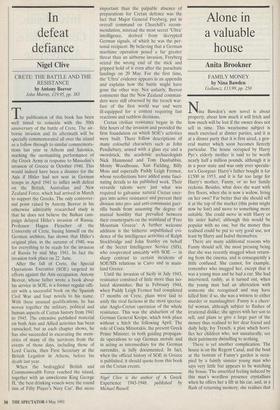In defeat defiance
Nigel Clive
CRETE: THE BATTLE AND THE RESISTANCE by Antony Beevor John Murray, £19.95, pp. 383 The publication of this book has been well timed to coincide with the 50th anniversary of the battle of Crete. The air- borne invasion and its aftermath will be specially commemorated all over the island as a follow through to similar commemora- tions last year in Athens and Salonica, marking the outstanding performance of the Greek Army in response to Mussolini's invasion of Greece in October 1940. This would indeed have been a disaster for the Axis if Hitler had not sent in German troops in April 1941 to inflict swift defeat on the British, Australian and New Zealand Force, which had arrived in March to support the Greeks. The only controver- sial point raised by Antony Beevor in his otherwise admirably researched study is that he does not believe the Balkan cam- paign delayed Hitler's invasion of Russia. Professor Hagen Fleischer of the University of Crete, basing himself on the German archives, has shown that Hitler's original plan, in the autumn of 1940, was for everything to be ready for the invasion of Russia by mid May 1941. In fact the invasion took place on 22 June.
After the fall of Crete, the Special Operations Executive (SOE) targeted its efforts against the Axis occupation. Antony Beevor, whose father wrote a book about his service in SOE, is a former regular offi- cer with a successful book on the Spanish Civil War and four novels to his name. With these unusual qualifications, he has woven together the military, political and human aspects of Cretan history from 1941 to 1945. The extensive published material on both Axis and Allied activities has been ransacked; but as each chapter shows, he has also succeeded in excavating the mem- ories of many of the survivors from the events of those days, including those of Lord Caccia, then First Secretary at the British Legation in Athens, before his death last year.
When the bedraggled British and Commonwealth Force reached the island, together with an unwelcome King George II, 'the best drinking vessels were the round tins of Fifty Player's Navy Cut'. But more
important than the palpable absence of preparations for Cretan defence was the fact that Major General Freyberg, put in overall command on Churchill's recom- mendation, misread the most secret 'Ultra' intelligence, derived from decrypted German signals, of which he was the per- sonal recipient. By believing that a German maritime operation posed a far greater threat than an airborne invasion, Freyberg seized the wrong end of the stick and gripped hold of it even after the parachute landings on 20 May. For the first time, the 'Ultra' evidence appears in an appendix and explains how the battle might have gone the other way. Not unfairly, Beevor comments that the New Zealand comman- ders were still obsessed by the trench war- fare of the first world war and were ill-equipped for a contest requiring fast reactions and ruthless decisions.
Cretan civilian resistance began in the first hours of the invasion and provided the firm foundation on which SOE's activities were built. There follow descriptions of many colourful characters such as John Pendlebury, armed with a glass eye and a swordstick, the academic archaeologists Nick Hammond and Tom Dunbabbin, Monty Woodhouse, Xan Fielding, Billy Moss and especially Paddy Leigh Fermor, whose recollections have added some fasci- nating details to his published work. Their versatile talents were just what was required to galvanise natural Cretan ener- gies into active resistance and prevent their division into pro- and anti-communist guer- rilla bands from assuming the degree of mutual hostility that prevailed between their counterparts on the mainland of 'Free Mountain Greece'. A further welcome addition is the hitherto unpublished evi- dence of the intelligence activities of Ralph Stockbridge and John Stanley on behalf of the Secret Intelligence Service (SIS), who cooperated amicably with SOE — in sharp contrast to certain incidents of SOE/SIS relations in Cairo and in main- land Greece.
Until the invasion of Sicily in July 1943, resistance consisted of little more than iso- lated skirmishes. But in February 1944, when Paddy Leigh Fermor had completed 17 months on Crete, plans were laid to unify the rival factions in the most spectac- ular Anglo-Cretan operation of the whole resistance. This was the abduction of the German General ICreipe, which took place without a hitch the following April. The role of Costa Mitsotakis, the present Greek Prime Minister, in both guiding propagan- da operations to sap German morale and in acting as intermediary for the German surrender, is fully documented. In fact, when the official history of SOE in Greece is published, it should quote from this book on the Cretan events.
Nigel Clive is the author of A Greek Experience 1943-1948, published by Michael Russell.


















































 Previous page
Previous page